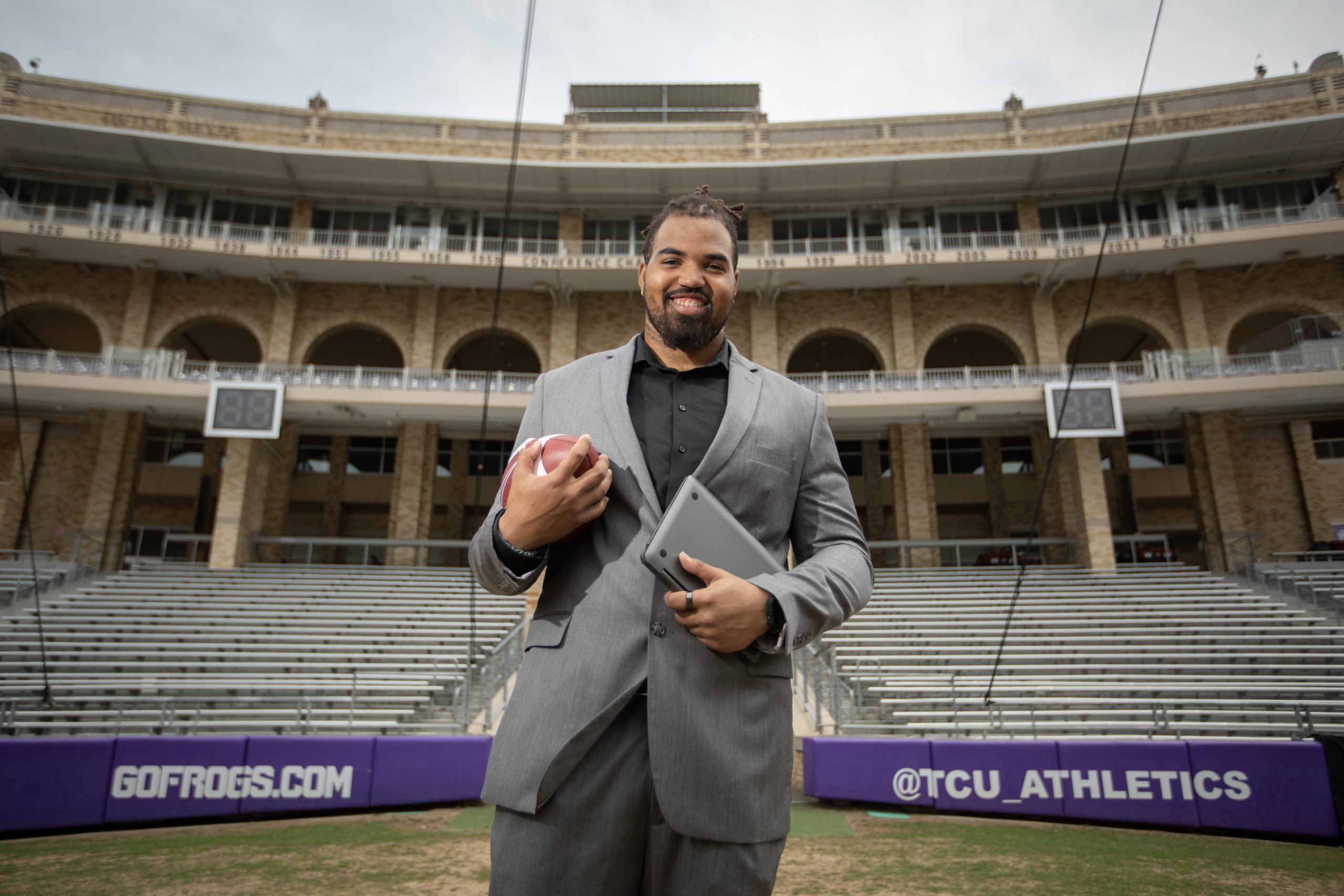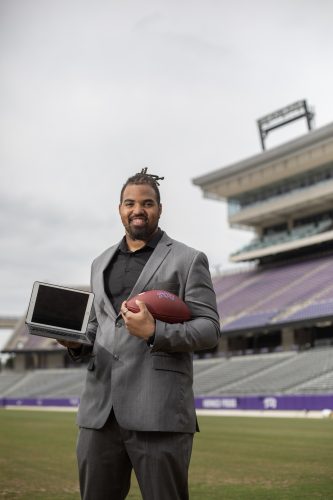What’s in a Name?
TCU and its supporters help student-athletes make the most of NIL opportunities.


TCU’s Scaled to Succeed program helps student-athletes, including Andrew Coker, navigate the complexities of the name, image and likeness rules. Coker also receives financial support from the Flying T Club, which arranges events for its ambassadors. Photo by Rodger Mallison
What’s in a Name?
TCU and its supporters help student-athletes make the most of NIL opportunities.
Now in his fifth year as an offensive lineman, Andrew Coker ’22 said he considers July 2021 a turning point in his career as a TCU football player. That year, the NCAA agreed to allow payments to players through NIL, which stands for name, image and likeness deals.
Some decried the 2021 ruling as the end of amateur athletics. Today’s student-athlete can be considered an independent brand as well as a traditional team player.
Leaders in TCU’s department of athletics and the Neeley School of Business partnered to create programs that help student-athletes capitalize on the new economic opportunities. Coker and his peers can attend academic classes geared to athletes while also receiving one-on-one mentoring for everything from branding to financial literacy.
“The tax help has been especially valuable,” Coker said. “I had a high school job and my dad always did my taxes, but the payments I get through NIL don’t have anything taken out, so I’ve had to learn to save some back.”
By winter 2022, the Flying T Club — an innovative collective of TCU fans — threw its full support behind the lineman. As a Flying T ambassador, Coker receives a monthly stipend and attends club events where he spends time with alumni and other TCU boosters.
“The tax help has been especially valuable. I had a high school job and my dad always did my taxes, but the payments I get through NIL don’t have anything taken out, so I’ve had to learn to save some back.”
TCU offensive lineman Andrew Coker
Coker has struck NIL deals on his own, too. Patrick Woodson ’89, the father of a classmate, recruited him to appear at the grand opening of his Dave’s Hot Chicken franchise near campus in April 2022.
“I got to hang out with some of my teammates, eat delicious chicken, meet fans, and I was paid for it,” Coker said. “That’s a win-win.”
Such arrangements were unthinkable prior to July 1, 2021. Scandalous, even.
In the mid-’80s, TCU’s football program was devastated after receiving a three-year probation from the NCAA when the program self-reported improper payments to a handful of football players. At the top end, those payments totaled around $1,800 a month.
“The football scandal nearly killed the program,” said Dan Williams, director of TCU Press. He revisited the controversy while working on a new history of the university, A Remarkable Story to Tell: TCU 1973-2023.
“There was a similar scandal with the track team several years later,” he said. “That was especially difficult for TCU, which presents itself publicly as an institution committed to its high values.”
Thanks to the rule change, payments today are fair game. In fact, in the two years since NIL went into effect, financial support to players has become vital to maintaining a high level of success in TCU’s 22 varsity-level sports.
“TCU’s not a massive institution with countless donors, so we couldn’t be passive about NIL. We had to take a strategic approach,” said Jeremiah Donati, director of intercollegiate athletics. “The rules were going to change. We knew we would suddenly have 525 student-athletes become entrepreneurs, so we became very intentional about supporting NIL.”
Prior to the ruling, Donati and TCU President Daniel Pullin, then dean of the Neeley School of Business, assembled a team of stakeholders to position the university at the forefront of innovation if and when NIL transformed college sports.
“We really beat a lot of universities to the marketplace,” Pullin said. “We felt like there was an opportunity to leverage our strength in education and our strength as one of the top athletics programs in the country.”
Unpacking NIL
Today’s collegiate athletes can credit the uncle of TCU basketball player Chuck O’Bannon Jr. with the NCAA’s decision on NIL. Ed O’Bannon led UCLA to a national championship in 1995 alongside Chuck’s father, Charles. More than a decade later, Ed O’Bannon came across a character in a basketball video game that was a dead ringer for him.
He filed a lawsuit, arguing that the NCAA’s rules illegally prevented student-athletes from monetizing their personal brands. The subsequent court decision in 2014 upended the idea of amateur athletics by determining the NCAA had violated antitrust laws.
Seven years later, the NCAA created an NIL policy that enabled student-athletes to sign endorsement deals. Anything from product placement postings on social media to public appearances became fair game.
Former TCU quarterback Max Duggan ’22 now receives a cut on every jersey with his name on it sold at the campus bookstore and elsewhere. LSU gymnast Olivia Dunne, a star social media influencer, has reportedly racked up more than $3 million in sponsorship deals.

TCU soccer forward A.J. Hennessey highlights products from companies like Mary Ruth Organics on Instagram and TikTok as part of her NIL deals. She and her teammates have held meet and greets at shops around Fort Worth. Photo by Christina Gandolfo
Coker, who has invested some of his earnings, said, “the money means that if something happens, I don’t have to rely on my family or friends.”
TCU pitcher Luke Savage, a senior, uses the money he earns from the Flying T Club to help pay for his education. “Especially with baseball not being a full-scholarship sport,” he said, “for myself and a lot of other guys, anything we’re getting goes straight to tuition, which takes a lot of pressure off our families.”
A.J. Hennessey, a sophomore forward on TCU’s soccer team, said that NIL impacted her decision to become a Horned Frog,
“TCU has more community support for and from the school,” she said. “I figured I’d have more opportunities if I went here.”
On Instagram and TikTok, Hennessey highlights products she has received from companies like Mary Ruth Organics. She and her teammates have held meet and greets at shops around Fort Worth, including MELT Ice Creams.
“I really like interacting with the younger soccer players who stop by,” Hennessey said. “At one event there were hundreds of young players, and it made me realize my platform has grown.
Scaling up
Scaled to Succeed launched in September 2021 to help students navigate the complexity of all manner of business arrangements.
To compete as Horned Frogs, athletes must maintain a minimum 2.3 grade point average and are allowed to practice their sport up to 20 hours a week. Because convenience was critical to Scaled to Succeed’s success, student-athletes are offered an array of options, including classroom instruction, easy-to-navigate online resources and mentoring sessions with faculty, alumni and area professionals.
Pullin aimed for a program “that would be nimble and agile with the way we’re providing content to really meet the student-athlete where they are.”
Under the umbrella of Scaled to Succeed, the business school created the Neeley NIL program, which takes a multifaceted approach to educating athletes about various opportunities with a focus not only on short-term gain but also on building a personal brand that would last a lifetime.

Andrew Coker said that the Neeley School of Business has helped him learn about how his NIL deals are impacted by income tax. Photo by Rodger Mallison
Rodney D’Souza, managing director of the Institute for Entrepreneurship and Innovation, spearheaded the program with Antonio Banos, associate director, Institute for Entrepreneurship and Innovation | Neeley NIL and the Bloxom Foundation Professor of Sports Entrepreneurship.
A three-credit class called Entrepreneurial NIL, offered by Neeley’s department of entrepreneurship and innovation, is open to non-athletes as well. In the spring, 90 students learned about brand management, business formation, financial literacy, contract management, taxation and legal issues, plus strategies for mental health and well-being.
Hennessey said the class helped her “understand the concept of branding and how to make the most of NIL.”
Outside the classroom, student-athletes have a dedicated space where they can connect with Neeley NIL faculty thanks to Ricky Stuart ’96. Stuart, who co-founded Chicken Express and whose son, Trey, is a member of the TCU men’s basketball team, made his suite in the Amon G. Carter Stadium available to the program.
“Our suite is right above where they eat and we only need it for six games a year,” said Stuart. Students can drop by the suite from 9 a.m.-9 p.m. Monday through Thursday and 9 a.m.-noon on Friday.
Stuart, an early member of the Flying T Club, also mentors student-athletes. “I’ve met students who genuinely want to learn about business and take advantage of whatever opportunities are out there,” he said.
By the end of the 2022-23 academic year, 411 TCU students had participated in some aspect of the Neeley NIL program, D’Souza said.
“We really think of it as NILE with the ‘E’ as empowerment,” D’Souza said. “Our goal is to have students take advantage of NIL without being taken advantage of.”
“Often students don’t think of themselves as entrepreneurs until they come to us. Our job is to help them realize what’s out there and help them build their brand, which should follow them long after they graduate.”
Rodney D’Souza, managing director of the Institute for Entrepreneurship and Innovation.
While by law no one at TCU can arrange an NIL deal for a student, the professors and mentors from the community — often those with legal, accounting or marketing expertise — provide guidance to students on their contracts. In a few instances, they’ve helped students terminate unfair or unfavorable contracts with marketing agencies.
Banos said he’s observed agencies with questionable motives and ethics approach TCU athletes, promising the moon.
“What we’re seeing is they’re signing as many as possible to build up that roster on their portfolios for the purpose of going for the student-athletes that they really want,” Banos said.
The lesser-known players might have signed a contract only to have the marketing agency do little on their behalf.
Now, as a result of Banos and D’Souza’s efforts, students are working with these agencies on a trial basis to see if it is a good fit.
“Often students don’t think of themselves as entrepreneurs until they come to us,” D’Souza said. “Our job is to help them realize what’s out there and help them build their brand, which should follow them long after they graduate.”
The professors likewise serve as matchmakers of sorts, not only connecting alumni with students but also introducing students who can help each other.
Hennessey partnered with an entrepreneurship student to help her grow her soccer camp. Jake Buete ’23 ran the camp’s logistics and marketed it so she could focus exclusively on the young players.
Ray Walls, associate athletics director for student-athlete experience, works alongside Scaled to Succeed. A former Indianapolis Colt and Baltimore Raven, Walls acknowledged that most student-athletes won’t go pro or compete in the Olympics.
“For student-athletes who take advantage of NIL in the right way,” Walls said, “it teaches them to value themselves.”
Flying High with Flying T
“One of the major challenges of NIL is that each school must go by state law, which means there are 50 different rules,” Donati said. “What’s OK for Washington State or Florida might not be OK for TCU or other schools in Texas.”
Texas law, for instance, prohibits student-athletes from endorsing alcohol, tobacco, e-cigarettes, anabolic steroids, casino gambling or sports wagering, nonlegal firearms and sexually oriented businesses. Texas did not allow universities to facilitate NIL deals for student-athletes, whereas some other states have permitted this.
Another consideration: Unlike, say, the University of Michigan with 750,000 living alumni as a built-in base of supporters, TCU just surpassed 100,000 living alumni at graduation in May.
The Flying T Club set out to harness purple passion to benefit its 70 current ambassadors, who compete for TCU in football, basketball, baseball and beach volleyball.
Rigorous attention to the legalities is one of many reasons Donati appreciates Flying T. Pullin said he admires the club’s entrepreneurial roots and approach.
Jeff Patman ’00, Ches Williams ’92 and Bryan Harlan ’97 intentionally ignored what every other NIL collective in the U.S. was doing.

A.J. Hennessey says NIL opportunities factored into her decision to become a Horned Frog. “TCU has more community support for and from the school.” Photo by Christina Gandolfo
They started with their friends. Ten men ponied up $5,000 apiece as seed money for the nonprofit, which later became a 501(c)3. Williams and Patman tracked down football great Marshall Harris ’79 in Paris to get permission to use the Flying T logo, which he created during his student days.
“He had one condition,” Williams said, “and that was that everything we did would benefit the athletes.”
The first official event was a small breakfast in Dallas. Patman’s friend Todd Wright ’06, then director of recruiting operations, helped line up four football players to attend the gathering, slated for the day before the Texas game in early October 2021.
“Everyone loved it,” Patman said. “We decided on a model where we brought people together with student-athletes at events to give alumni and other supports a unique experience.”
“We knew we had something special,” Williams said. “We decided we were going to build our own playbook and work like crazy to get more people to come in because this ecosystem where we’ve got alumni, supporters and athletes all kind of coming together is something we wanted to see grow and last.”
By the end of the first year, they had close to 30 ambassadors. In less than two years, about 400 members donating anywhere from $25 to well north of six figures meant the club raised more than $5 million.
“We were at the forefront of NIL, really kind of a pathfinder,” Harlan said, noting that several other booster groups ultimately joined Flying T, making it TCU’s only collective.
“There are a lot of schools out there that haven’t achieved anything like we’ve done,” Harlan said.
And while collectives around the country were making news for questionable ethics like promising recruits millions of dollars only to renege when they couldn’t foot the bill, the Flying T consulted attorneys and hired a staff of three to make sure the club did everything by the book.
In January 2023, John Denton ’85 left the university after nearly 18 years as an associate athletic director and 34 years in the broadcast booth on the Horned Frogs Sports Network to become Flying T’s executive director. He joined Wright, Flying T’s director of player personnel, and Jessica Cung, director of operations, who’d worked at TCU for 15 years.
“Flying T is an easy sell to TCU fans who want to win,” Denton said. “If we don’t do what we need to do for these student-athletes, we’re going to go back to what TCU Football was when I was playing in the 1980s.
“When I was in the program,” he said, “we won 15 games in five years. Last year the Frogs won 13 games.”
“The Flying T Club has been awesome not only for baseball but for other sports in terms of being able to help these young men and women make TCU more affordable,” said Kirk Saarloos, TCU’s head baseball coach.
“For some of our guys,” he said, “it’s not really spending income but income for their family to offset loans or pay tuition and room and board.”
Flying T sends its ambassadors monthly checks that vary according to the individual’s profile as well as level of participation in the collective’s programs.
Saarloos said his players appreciate seeing Flying T Club members in the stands because they’ve often had meaningful conversations with them. Many alumni with backgrounds in business and finance like Harlan, Patman and Williams are quick to share their expertise.
“Most of the ambassadors are not going to go on to play professional sports, but a lot of them are going to choose to live in this area,” Williams said. “They need careers and what better way to connect them to alumni that really do care about them and want to see them be successful.”
Plans for the collective include recruiting more corporate sponsors and expanding membership beyond North Texas, where most of its supporters currently live.
“Flying T is really about the true love that we have for TCU,” Patman said. “One of the things that makes TCU such a successful, awesome place is the passion our alumni have for the school.
“Helping and mentoring these student-athletes,” he said, “is a way we’ve found to give back while having a great time.”
FIND OUT MORE about Flying T Club membership, visit flyingtclub.com

Your comments are welcome
Comments
Related reading:
Sports: Riff Ram
Football Powerhouse
The 1930s were a golden age for TCU Football under legendary coach Dutch Meyer.
Sports: Riff Ram
Flashback to Freshman Football
Wogs players spent a year preparing to become full-fledged Frogs.
Alumni
How James Cash Changed TCU Forever
He has authored a pioneering career on TCU’s basketball court and beyond.